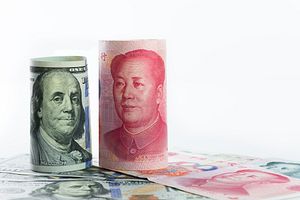Foreign direct investment (FDI) in China hit a two-year low in August, rekindling concerns about a slowing economy. China’s Commerce Ministry announced on Tuesday that China brought in $7.2 billion in FDI in August 2014, the lowest level since February 2012.
August’s FDI levels represented a 14 percent drop from August 2013. There was also a steep year-on-year decline in July, when FDI levels were 17 percent lower than the previous year. For the year to date, the outlook is not as grim — FDI in China through the end of August totaled $78.3 billion, only 1.8 percent less than the same period in 2013. Shen Danyang, a Commerce Ministry spokesperson, said that he still expected FDI for 2014 to hit $120 billion, $2 billion more than last year’s total.
Analysts agreed that the total drop in FDI for the first eight months of 2014 is largely caused by a rapid decline in foreign interest in China’s manufacturing sector. Shen noted that manufacturing FDI through August 2014 was down by 15.7 percent compared to last year. China’s factory output in August grew by only 6.9 percent compared to the previous year, the smallest amount of growth since 2008 and far below expectation of 8.8 percent growth.
In part, the slowdown in both manufacturing and manufacturing-related FDI is connected with the Chinese government’s plan to restructure China’s economy away from a reliance on export-oriented manufacturing. Beijing is pushing for a more sustainable economic model, one based on domestic consumption and the service industries. FDI in China is beginning to reflect this shift — while manufacturing FDI was down sharply, foreign investment in China’s service industries had actually increased by 8.9 percent over the first eight months of 2013, according to Shen.
Some analysts also suggested that the drop in FDI this summer was due to China’s vigorous anti-monopoly investigations. Foreign firms have complained that they are being unfairly targeted by the probes, a charge that Chinese officials (including Premier Li Keqiang) have denied. Chinese officials have also promised a more open environment for foreign companies. At this week’s China-ASEAN Expo, Zhou Qiang, the president of the Supreme People’s Court, said that China will continue to reform its justice system “to ensure an open, transparent and predictable judicial environment for investments.”
Despite Beijing’s reassurances, a survey of American Chamber of Commerce in China members found that 60 percent of respondents feel foreign businesses are less welcome in China than they were previously. A report from the U.S. Chamber of Commerce noted that China’s anti-monopoly investigations “often appear designed to advance [China’s] industrial policy and boost national champions.”
Shen Danyang dismissed concerns that FDI was dropping due to the anti-monopoly investigations. “This is more of an emotional response from some foreign-invested companies and the exaggeration of the media,” he told reporters. “It is not an indication that China’s business environment has deteriorated.” Shen pointed to a lack of abnormal outflows of foreign capital as a sign that investors remain bullish on China as a whole. An analysis by the Wall Street Journal agreed that, over the long term, China’s economy will continue to be an attractive option for foreign investment. However, current foreign concerns about the business environment might cause a short-term slowdown in FDI.

































